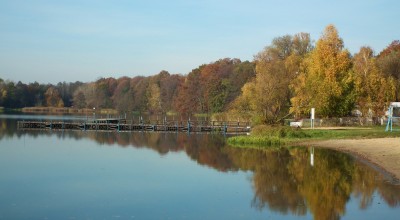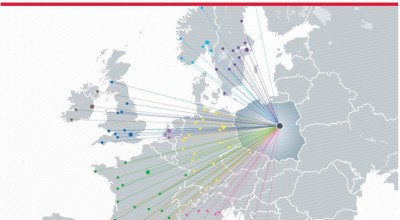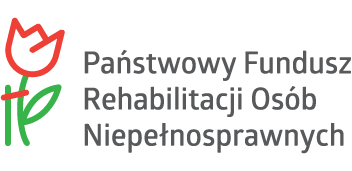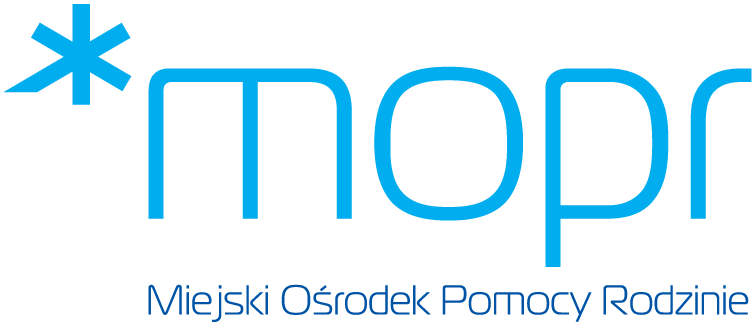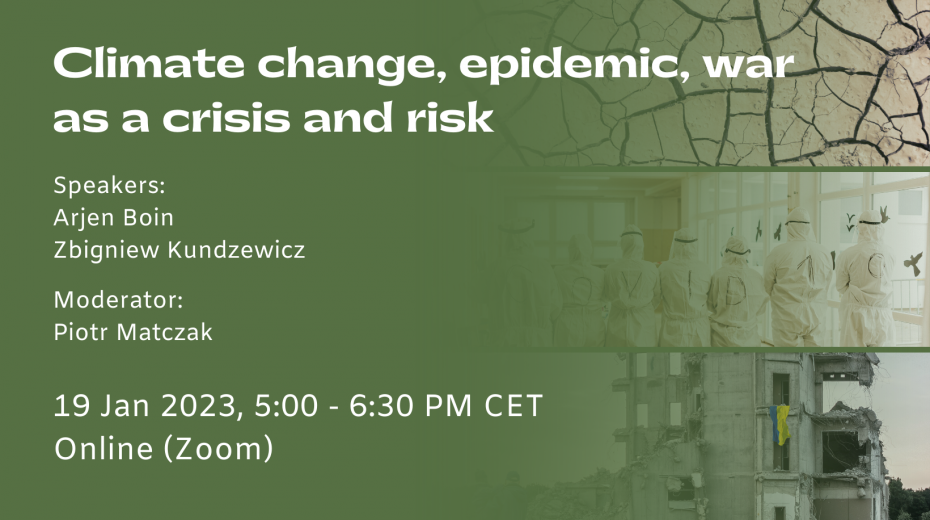Zapraszamy do udziału w webinarze pt. "Climate change, epidemic, war as a crisis and risk", który odbędzie się online 19 stycznia o godz. 17:00. Spotkanie odbędzie się w języku angielskim. Konieczna rejestracja - link znajduje się poniżej.
"Climate change, epidemic, war as a crisis and risk"
When: January 19th (Thursday), 5.00-6.30 PM CET online (Register - https://forms.gle/DAWb2aJh8CguPxLV6)
Organized by: Transdisciplinarity: Independent Academic Initiative
Speakers:
- Arjen Boin (Leiden University, The Netherlands)
- Zbigniew Kundzewicz (Poznań University of Life Sciences, Poland)
Moderator: Piotr Matczak (Adam Mickiewicz University)
Abstract
The concept of crisis indicates tension, danger, and a breakthrough that takes place over a limited period of time. Consequently, dealing with a crisis requires not only finding remedies but also applying them in a situation of temporal tension. With regard to contemporary environmental threats, the IPCC reports have defined the use of the concept of risk (as a combination/product of the three parameters: hazard, exposure, vulnerability) to describe threats. Meanwhile, the concept of crisis, and especially the temporal aspect of the crisis, allows one to analyze the different paces of social and natural processes. In this context, one can indicate micro-scale crises, e.g. flash floods, where a crisis (catastrophe) occurs when the hydrological process is faster than the reaction of the social system, or - on a macro scale, e.g. a climate crisis, epidemics, or war, where the processes take place in the perspective of decades or centuries. This raises the question of to what extent the concepts of risk and crisis are competitive or complementary and to which extent are instrumental in combining the natural, social, and human sciences perspectives to better understand the world.
Webinar is a part of a series of seminars entitled „Resilience in the context of permanent crisis”
Please register to participate: https://forms.gle/DAWb2aJh8CguPxLV6
Arjen Boin is Professor of Public Institutions and Governance at the Institute of Political Science, Leiden University. He has published widely on topics of crisis and disaster management, leadership, institutional design and organizational issues. His most recent books include Guardians of Public Value, Understanding the Creeping Crisis and Governing the Pandemic (all three were published in 2021 by Palgrave and can be downloaded for free). His book Managing Hurricane Katrina (Louisiana State University Press, 2019) investigates the lessons that should be learned from this mega-disaster. His other books include The Politics of Crisis Management (Cambridge University Press, winner of APSA’s Herbert A. Simon book award), Governing after Crisis (Cambridge UP, 2008), Crisis Management: A Three Volume Set of Essential Readings (Sage, 2008), Designing Resilience (Pittsburgh UP, 2010), MegaCrises (Charles C Thomas, 2012) and The EU as Crisis Manager: Patterns and Prospects (Cambridge UP, 2013). Arjen is also a managing partner at Crisisplan BV and a founding member of the European Societal Security Research Group.
Zbigniew W. Kundzewicz, a Corresponding Member of the Polish Academy of Sciences and a Member of Academia Europaea is a Professor of Earth Sciences (since 1993) at Poznan University of Life Sciences. He has been a Coordinating Lead Author of Chapter 13 (Europe) in IPCC (Intergovernmental Panel on Climate Change) WG2 TAR (Climate Change - Impacts, Adaptation, Vulnerabilities); Chapter 3 (Freshwater resources and their management) in IPCC WG2 AR4; IPCC Technical Paper on Climate Change and Water; and Chapter 4 of the IPCC Special Report on Extremes; hence part of the inner circle of the IPCC (2007 Nobel Peace Prize laureate). He has been a Member of the Advisory Board on the Environment (including Climate Change) of the European Union Seventh Framework Programme, Editor-in-Chief of an international scientific bi-monthly „Hydrological Sciences Journal” and member of editorial boards of several scientific journals. He has been a recipient of a Dooge Medal of the IAHS/UNESCO/WMO International Hydrology Prize (2017) and a Prince Sultan Bin Abdulaziz International Prize for Water – The Surface Water Prize (2020). He has published nearly 600 scientific publications.
Piotr Matczak is professor at the Faculty of Sociology, Adam Mickiewicz University. He works on natural and man-made risks, crisis management, environmental policy from the perspective of ecosystem services, and sustainable development of urban and rural communities. He participated in several research programs, Polish and international ones, on those issues. He was Secretary of the Committee for Risk Studies of the Polish Academy of Sciences and a member of the Board of Sociology of Risk and Uncertainty Research Network of the European Sociological Association. He is editor of the journals: "Society and Natural Resources", "Water" and "Geographies". He co-edited a special issue of the Water magazine entitled "Flood Risk Governance for More Resilience". He published, inter alia, in: "Proceedings of the National Academy of Sciences", "Environmental Science & Policy", "Weather, Climate and Society", "Ecosystem Services", "Ecology and Society", "Earth's Future", "Global Environmental Change", "WIREs Water".
Resilience in a world of permanent crisis
The Transdisciplinary Seminar Series in the fields of humanities, social and natural sciences
Winter and summer semesters, 2022-2023
The seminar series was initiated in the summer of 2021 when a group of scholars representing various disciplines from three Polish Universities started informal discussions driven by the need to understand the origins of the crises and how to cope with them. We observe an escalation of tensions around the world. Threats develop into permanent crises. It is becoming evident that the effectiveness of the existing systems of order has been undermined. These circumstances require a reworking of customary remedies. This seminar series relies on a critical examination of our disciplinary understanding of knowledge and science. It aims at constructing new strategies and methods to cope with the challenges.
The current world situation is characterized by an escalation of tensions and violence related to phenomena such as migration, imperialism and neocolonialism, racism, terrorism, war, as well as climate change, declining biodiversity, and ecological disasters. These threats develop into permanent crises and force an accelerated adaptation to life in worsening conditions. It is becoming evident that the effectiveness of the existing systems of an order has been undermined, and questioned, and that the current circumstances require a reworking of the existing solutions. After a period of diagnosing problems, strategies and methods to cope with them are needed. Meeting these challenges may result in an amalgamation of the fields of humanities, social and natural sciences that help develop a shared understanding of knowledge and science. It should be practical and socially beneficial, and the results of scientific research should offer solutions to the problems. It must be accompanied by a critical reflection referring to previous attempts to develop such solutions, which will reveal their limitations and, as a result, enable a proper and adequate diagnosis of the current situation as well the development of approaches to manage the crises with which the present-day grapples. To a greater extent than ever before, we are faced with the need to contextualize scientific knowledge in relation to commonsense knowledge, as well as to seek and recognize complementarity between Western and Indigenous knowledge.
In this state of affairs, it is worth considering whether and to what extent the knowledge we create contributes to constructing a “culture of preparedness” understood as the ability to quickly and effectively adapt to frequent and radically changing circumstances. This culture requires anticipatory thinking, mobilizing creative imagination, and thinking in terms of foresight. Forward-thinking requires the commonality of science languages (humanities, social, and natural sciences). This signifies the need to develop an appropriate set of key concepts, methods, theories, and research perspectives that will meet cognitive needs and define effective fields of knowledge needed to deal with problems of the present day. Therefore, one must look for a "cognitive superstructure,” and "conceptual deposits of knowledge" as prototypical solutions for knowledge that is yet to be created.
The adoption of such a strategy will allow for an adequate definition of the conditions for the development of adaptability to the changing environment and the uncertain realities of life. These competencies and abilities help to build resilience in the condition of permanent crisis and the sense of danger associated with it, whether real or artificially induced. In this context, transdisciplinary security studies and the concept of community resilience combining various disciplines constitute a useful research platform allowing to recognize the abilities of various life forms to “positive adaptation,” i.e. creating a habitat that effectively adjusts to changing conditions.
















